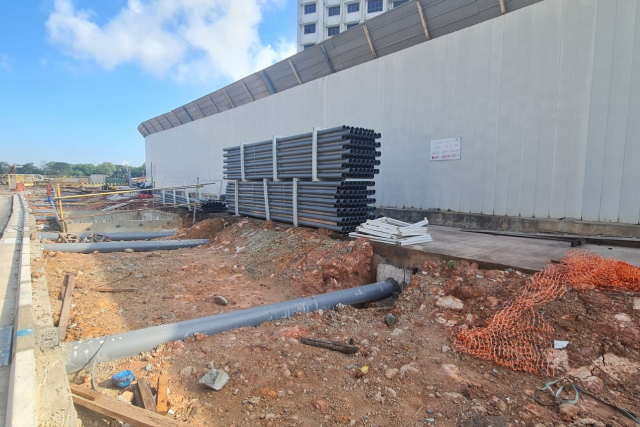
20 Dec Why PVC Pipe Fittings Are Preferred For Industrial Use
PVC pipe fittings have become an essential part of various industries due to their versatility, strength, and durability. From manufacturing plants to construction sites and agricultural setups, PVC pipes are a common fixture because they can handle a wide range of conditions and tasks. The durable yet lightweight nature of PVC pipe fittings makes them ideal for industrial use, allowing for easy installation and long-term performance.
You may have noticed PVC pipes in your home plumbing system, but in industrial applications, they play an even more significant role. PVC fittings are designed to handle higher pressures, varying temperatures, and challenging environments that typical home systems may not encounter. In factories, agricultural settings, and even chemical processing plants, PVC fittings are widely used due to their cost efficiency and reliability, making them a preferred choice for countless applications.
Why PVC pipe fittings are ideal for industrial use
One of the standout features of PVC pipe fittings is their durability. Unlike metal, PVC does not rust or corrode, making it highly resistant to the conditions that industrial environments often present. Whether it’s exposure to chemicals, moisture, or even salt, PVC fittings remain unaffected, giving them a much longer lifespan than many other materials. This durability is why companies frequently seek a reliable PVC pipe supplier for their operations, knowing that the investment will last over time.
Additionally, PVC is remarkably lightweight, which greatly eases transportation and installation. Heavy materials can increase both labour and shipping costs, but PVC offers a practical alternative without compromising on strength. For example, in construction projects, using a PVC pipe in Singapore for drainage or waste systems can simplify the process, as these pipes can be transported and assembled with fewer resources.
Cost-effective and energy efficient
Cost efficiency is another compelling reason why industries prefer PVC pipe fittings. PVC tends to be more affordable than metal alternatives, not just in the initial purchase price but also in the long run due to its low maintenance requirements. Maintenance costs can add up quickly for industrial systems, especially if corrosion or chemical damage frequently affects the pipes. PVC fittings, however, require minimal upkeep, saving businesses both time and money.
Moreover, the production of PVC pipe fittings is energy-efficient compared to many other materials. PVC requires less energy to manufacture, contributing to its appeal as a sustainable option. In the evolution of PVC pipes in modern construction today, we see that many companies are shifting to PVC not only for its durability and cost-effectiveness but also to reduce their environmental footprint.
Resistant to chemicals and harsh substances
Industrial environments often involve exposure to chemicals or substances that can degrade other materials over time. PVC is highly resistant to a broad range of chemicals, which is why it’s frequently used in factories and chemical processing plants. Unlike some metals, which may react or corrode when in contact with harsh substances, PVC fittings hold up well and maintain their integrity, making them ideal for applications that require resilience and safety.
For example, many companies that handle waste management or water treatment prefer PVC fittings, as these systems are often exposed to contaminants and corrosive chemicals. With PVC, they can have peace of mind knowing that their pipes and fittings won’t deteriorate, reducing the risk of leaks or breakdowns in the system.
Versatility and customisation
PVC pipe fittings are incredibly versatile and can be customised to suit various industrial needs. With a range of shapes, sizes, and connectors available, PVC fittings allow for flexibility in design and installation. This adaptability is particularly beneficial in industries where piping systems need to be modified or expanded over time. Rather than replacing entire systems, companies can easily adapt and add new fittings, which is both time-efficient and cost-effective.
This adaptability also makes PVC suitable for specific applications, from water distribution and drainage systems to electrical conduits. For instance, in Singapore’s construction industry, a PVC pipe supplier is often chosen for projects where versatility and scalability are necessary. PVC can be shaped to fit complex layouts, making it a perfect choice for large-scale, complex projects.
Safety and hygiene in industrial applications
PVC pipe fittings are not only durable and cost-effective but also safe and hygienic. In industries such as agriculture and food processing, materials used in piping need to meet strict standards to ensure the safety of the products. PVC is non-toxic and safe for transporting potable water, which is why it’s commonly used in systems that handle food and water.
For companies involved in agriculture, PVC pipes provide a reliable solution for irrigation systems. With its smooth inner surface, PVC ensures that water flows through efficiently without clogging, reducing the risk of contamination.
Temperature and pressure resistance
Industrial environments often require materials that can withstand fluctuating temperatures and high pressures, particularly in manufacturing and chemical plants. PVC pipe fittings are designed to endure such conditions without warping, cracking, or breaking. Although they may have certain limits when it comes to extreme temperatures, PVC fittings are suitable for most industrial applications, as they perform well within a wide temperature range.
In Singapore’s industrial landscape, where factories and construction projects frequently experience high pressures, PVC pipes are a reliable choice for water supply and waste management systems. Their resilience helps prevent breakdowns and interruptions in service, providing industries with uninterrupted productivity.
Conclusion
PVC pipe fittings are the backbone of many industrial applications due to their durability, affordability, and versatility. Resistant to chemicals and harsh environments, PVC proves to be a practical and reliable material for a range of applications, from chemical processing to agriculture. With their ability to handle high pressures and resist corrosion, PVC fittings deliver lasting performance, saving companies time and maintenance costs.
For companies seeking a dependable solution for their piping systems, Vicplas offers a comprehensive range of quality PVC fittings that stand the test of time.
